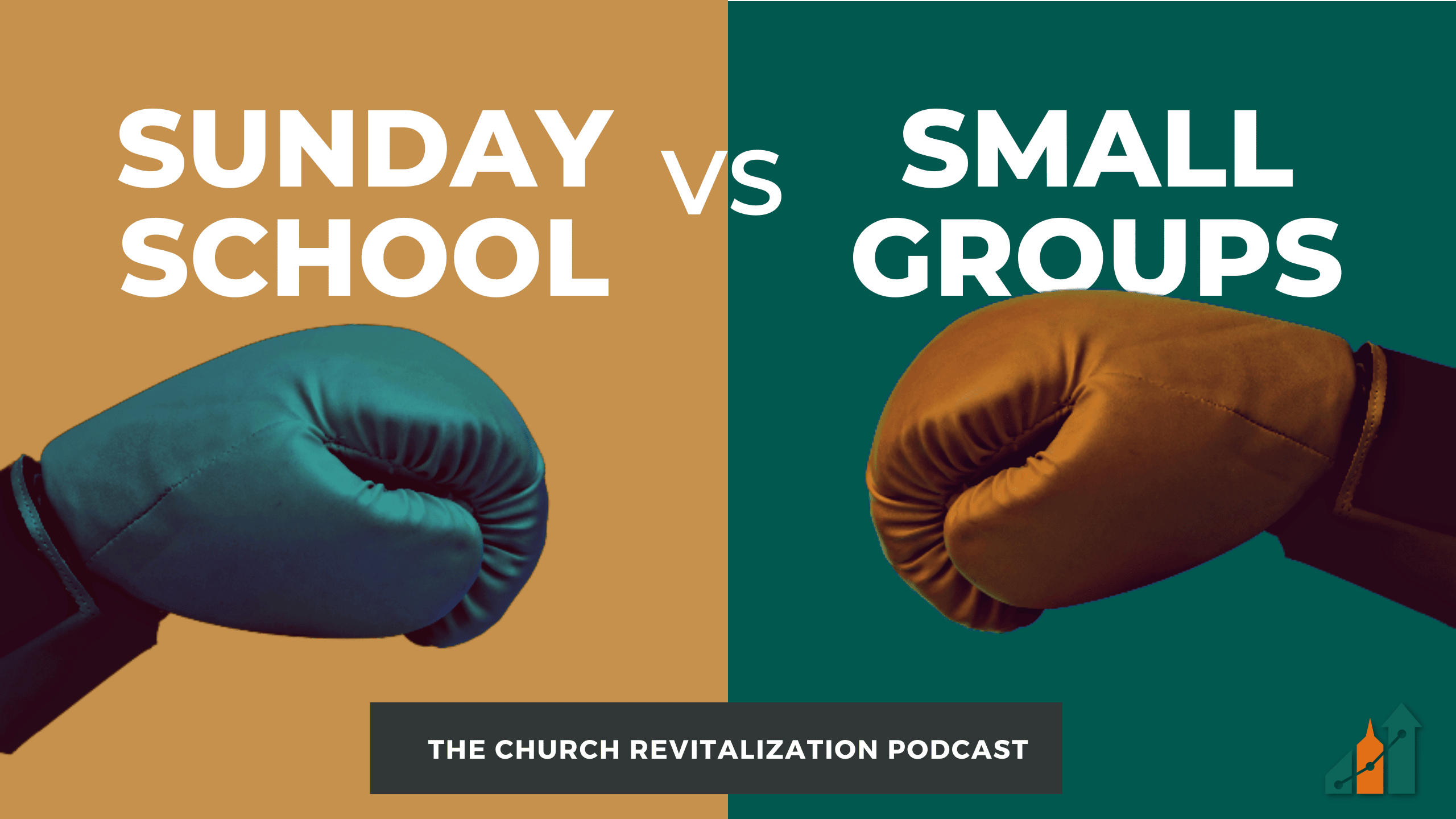The Church Revitalization Podcast – Episode 158
It’s the heavyweight title fight of church discipleship ministries. Perhaps second only to church “worship wars” between traditional and contemporary music, the battle between Sunday School and Small Groups has been waging for a few decades now too. As is the case with many church debates, there usually is common ground to be found when people set aside their personal preferences, and focus more on desired discipleship outcomes. Additionally, a little bit of outside-the-box thinking can make either choice work well in most ministry contexts.
Subscribe below to never miss an episode.
Traditional (limiting) definition of each:
Sunday School – A Sunday morning gathering of people on the church property in a classroom space for the purpose of instruction in the bible or other topics.
Small Groups – A group of people, usually smaller than a Sunday School class, that meets in someone’s home one or more times per month for the purpose of fellowship and bible instruction.
Sunday School Pros:
- Greater attendance because people are already on the church property.
- Possibly larger group size allows for less personal engagement by those who prefer that.
- Opportunity for deeper study on sermon topics.
- Easier to handle childcare.
Sunday School Cons:
- Possibly less personal relationship growth in larger classes.
- Physical space needed for growth.
- Those who cannot attend church on Sunday morning then they miss their discipleship too.
Small Groups Pros:
- Flexible meeting days and times may fit more people.
- Greater relationship growth.
- Opportunity for deeper study on sermon topics.
- Only limited by developing leaders instead of physical space.
Small Groups Cons:
- Can be uncomfortable at first for some people to get started.
- May be hard to break into existing relationships.
- Childcare can be challenging.
The most important consideration in this is our desired discipleship outcome. If Sunday School or small groups are limited in purpose and not providing the discipleship that our people need, then something needs to change.
If all our Sunday School is doing is giving people a little bit of bible study or maybe just some varied topical life applications, then maybe we need to change things up to allow for deeper fellowship.
If all our small groups do is eat dinner together and every now and then go through some book that someone picks out, then we need to change things up and get people deeper into God’s Word.
We have seen lots of different small groups and Sunday school formats over the years. Some work well and others don’t. The ones that work well are the ones that consistently and predictably provide the discipleship components that the people of the church need to grow in maturity.
There are six characteristic actions of maturity that we see in Acts 2:41-47:
- Worship
- Prayer
- Fellowship
- Service / Generosity
- Bible Instruction
- Evangelism
The object is to organize the ministries of the church in a way that allows for and encourages everyone to engage in these things consistently. If the existing primary discipleship ministry in your church is leaving a gap, then it needs to change.
How can we make this work?
First, we need to be open to the possibility of breaking out of the box that both of these options have been put into. Let’s start with what we call them. If we didn’t change anything about our existing Sunday School classes, but started calling them “small groups” or “community groups” or “discipleship groups” would the world end? Actually for some, yes, but we can’t lead the church effectively by catering to that minority mindset.
For other people the term “small group” has baggage and turns them off. It doesn’t matter what you call the ministry. What matters is what it does. There will always be a name that will work fine for most people. Most others will come around when they see that the sun came up again and you didn’t make them never see their friends again.
The greatest communication tool you’ll have for change, though, is casting the vision for why the change is needed and what the benefits will be when implemented.
Watch this episode on YouTube


A.J. Mathieu is the President of the Malphurs Group. He is passionate about helping churches thrive and travels internationally to teach and train pastors to lead healthy disciple-making churches. A.J. lives in the Ft. Worth, Texas area, enjoys the outdoors, and loves spending time with his wife and two sons. Click here to email A.J.

